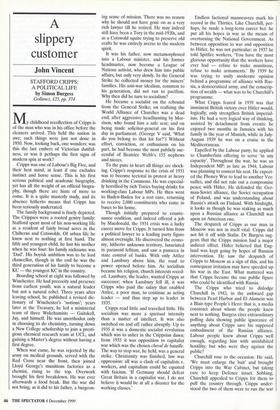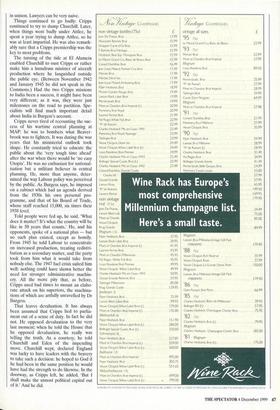A slippery customer
John Vincent
STAFFORD CRIPPS: A POLITICAL LIFE by Simon Burgess Goliana, f25, pp. 374
My childhood recollection of Cripps is of the man who was in his office before the cleaners arrived. This held the nation in awe; such things were just not done in 1950. Now, looking back, one wonders: was this the last embers of Victorian dutiful- ness, or was it perhaps the first signs of modern spin at work?
Cripps was one of Labour's Big Five, and their best mind, at least if one excludes instinct and horse sense. This is his first serious political and academic biography, yet has all the weight of an official biogra- phy, though there are hints of more to come. It is a quite masterly study, and its absence hitherto means that Cripps has been seriously underrated.
The family background is finely depicted. The Crippses were a rooted gentry family: Stafford spent most of his non-working life as a resident of fairly broad acres in the Chilterns and Cotswolds. Of urban life he knew next to nothing at first hand. The fifth and youngest child, he lost his mother when he was four: his family nickname was 'Dad'. His boyish ambition was to be lord chancellor, though in the end he was the third generation of his family to become a KC — the youngest KC in the country. Boarding school at eight was followed by Winchester. He had precocity and presence from earliest youth, was a natural leader but not a natural rebel. Three years after leaving school, he published a revised dic- tionary of Winchester's 'notions'; years later at the Treasury, he led a ministerial team of three Wykehamists — Gaitskell, Jay, and himself. He was unorthodox only in choosing to do chemistry, turning down a New College scholarship to join a presti- gious chemical research team at UCL, and gaining a Master's degree without having a first degree.
When war came, he was rejected by the army on medical grounds, served with the Red Cross near the front, then joined Lloyd George's munitions factories as a chemist, rising to the top. Overwork brought his first breakdown. He was ever afterwards a food freak. But the war did not bring, as it did to his father, a burgeon-
ing sense of mission. There was no reason why he should not have gone on as a very rich lawyer till he retired. He may indeed still have been a Tory in the mid-1920s, and as a Cotswold squire trying to preserve old crafts he was entirely averse to the modern spirit.
It was his father, now metamorphosed into a Labour minister, and his former headmaster, now become a League of Nations activist, who drew him into public affairs, but only very slowly. In the General Strike he collected money for the miners' families. His anti-war idealism, common to his generation, did not run to pacifism. Why then did he turn to socialism?
He became a socialist on the rebound from the General Strike; on realising the World Alliance of Churches was a dead end; after aggressive headhunting by Mor- rison, who found him a safe seat; and on being made solicitor-general on his first day in parliament. (George V said, 'What do you belong to that lot for?') Without effort, conviction, or enthusiasm on his part, he had become the most publicly suc- cessful of Beatrice Webb's 155 nephews and nieces.
To the pure in heart all things are shock- ing. Cripps's response to the crisis of 1931 was to become teetotal in protest at heavy drinking in the Commons. He was especial- ly horrified by rich Tories buying drinks for working-class Labour MPs. He then went to Baden-Baden for a rest cure, returning to receive 2,000 constituents who came in buses to his home.
Though initially prepared to counte- nance coalition, and indeed offered a job by Macdonald, the 1931 crisis was a lucky career move for Cripps. It turned him from a political lawyer to a leading party figure almost overnight. He discovered the econo- my, hitherto unknown territory, luxuriated in paranoid leftism, and saw a panacea in state control of banks. With only Attlee and Lansbury above him, the road to power opened before him. As socialism became his religion, church interests reced- ed. Lansbury, the leader, wanted Cripps as successor; when Lansbury fell ill, it was Cripps who paid the salary that enabled Attlee, a poor man, to continue as acting leader — and thus step up to leader in 1935.
Cripps read little and travelled little. His socialism was more a spiritual intensity than a matter of intellect. It was also switched on and off rather abruptly. Up to 1935 it was a domestic socialist revolution which was to usher in the Crippsian dawn; from 1935 it was opposition to capitalist war which was the chosen cheval de bataille. The way to stop war, he held, was a general strike. Christianity was finished, law was oppression: all was a clash of capitalists v. workers, and capitalism could be equated with fascism. 'If Germany should defeat Great Britain in a capitalist war, I do not believe it would be at all a disaster for the working classes.' Endless factional manoeuvres mark his record in the Thirties. Like Churchill, per- haps, he made a long-term career bet: he put all his hopes in war as the means of overturning the National Government. As between opposition to war and opposition to Hitler, he was not particular: in 1937 he told Spitfire workers, 'You have the most glorious opportunity that the workers have ever had — refuse to make munitions, refuse to make armaments.' By 1939 he was trying to unify moderate opinion behind a programme of alliance with Rus- sia, a democratised army, and the conscrip- tion of wealth — what was to be Churchill's programme.
What Cripps feared in 1939 was that imminent British victory over Hitler would, logically, only strengthen British imperial- ism. He had a very logical way of thinking, assisted by detachment from events: he enjoyed two months in Jamaica with his family in the year of Munich, while in July- August 1939 he was on a cruise in the Mediterranean.
Expelled by the Labour party, he applied to Chamberlain offering to serve 'in any capacity'. Throughout the war, he was an Independent MP: as late as 1944, Labour was planning to contest his seat. He expect- ed the Phoney War to lead to another Ver- sailles, and did not rule out a compromise peace with Hitler. He defended the Ger- man-Soviet alliance, the Soviet occupation of Poland, and was understanding about Russia's attack on Finland. With hindsight, it looks as though he was staking as much upon a Russian alliance as Churchill was upon an American one.
The despatch of Cripps as our man in Moscow was not in itself vital. Cripps did not hit it off with Stalin. Dr Burgess sug- gests that the Cripps mission had a major indirect effect. Hitler believed that Eng- land was kept going by hopes of Russian intervention. He saw the despatch of Cripps to Moscow as a sign of this, and his consequent irritation may have speeded up his war in the East. What mattered was that Cripps became the one public figure who could be identified with Russia.
The Cripps who tried to dislodge Churchill in 1942, in the awkward gap between Pearl Harbor and El Alamein was a Blair-type People's Hero: that is, a media construct about whom the people knew next to nothing. Burgess cites extraordinary polling data showing public ignorance of anything about Cripps save his supposed embodiment of the Russian alliance. Labour people knew about Cripps well enough, regarding him with uninhibited hostility; but who were they against the public?
Churchill rose to the occasion. He said, 'We must enlarge the bait' and brought Cripps into the War Cabinet, but taking care to keep Defence intact. Sobbing, Churchill appealed to Cripps for them to pull the country through. Cripps under- stood the two of them were to run the war in unison. Lawyers can be very naive.
Things continued to go badly: Cripps continued to try to dump Churchill. Later, when things went badly under Attlee, he spent a year trying to dump Attlee, so he was at least impartial. He was also remark- ably sure that a Cripps premiership was the key to most problems.
The turning of the tide at El Alamein enabled Churchill to oust Cripps or rather make him a humdrum minister of aircraft production where he languished outside the public eye. (Between November 1942 and January 1945 he did not speak in the Commons.) Had the two Cripps missions to India been a success, it might have been very different; as it was, they were just milestones on the road to partition. Spe- cialists will find much important detail about India in Burgess's account.
Cripps never tired of recounting the suc- cess of his wartime central planning at MAP: he was to bombers what Beaver- brook was to fighters. It was during the war years that his ministerial outlook took shape. He constantly tried to educate the public about the 'very tough time ahead' after the war when there would be 'no easy Utopia'. He was no enthusiast for national- isation but a militant believer in central planning. He, more than anyone, deter- mined the way Labour policy was perceived by the public. As Burgess says, he imposed on a cabinet which had an agenda derived from the 1930s his own personal pro- gramme, and that of his Board of Trade, whose staff reached 15,000, six times their 1938 level.
Told people were fed up, he said, 'What does it matter? It's what the country will be like in 50 years that counts.' He, and his opponents, spoke of a national plan - but no such plan existed, except as homily. From 1945 he told Labour to concentrate on increased production, treating redistri- bution as a secondary matter, and the party took from him what it would take from nobody else. The 1947 fuel crisis suited him well: nothing could have shown better the need for stronger administrative machin- ery. All the more pity that, as before, Cripps used bad times to mount an elabo- rate attack on his superiors, the machina- tions of which are artfully unravelled by Dr Burgess.
That leaves devaluation. It has always been assumed that Cripps lied to parlia- ment out of a sense of duty. In fact he did not. He opposed devaluation to the very last moment; when he told the House that he opposed devaluation, he really was telling the truth. As a courtesy, he told Churchill and Eden of the impending move. Churchill wept, declared England was lucky to have leaders with the bravery to take such a decision: he hoped to God if he had been in the same position he would have had the strength to do likewise. In the doorway, as Cripps left, he added, 'But I shall make the utmost political capital out of it.' And he did.



















































































 Previous page
Previous page